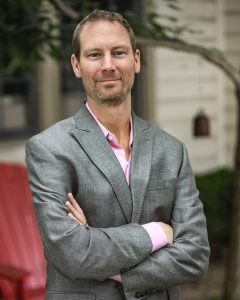 Dr. Carey W King performs interdisciplinary research related to how energy systems interact within the economy and environment as well as how our policy and social systems can make decisions and tradeoffs among these often competing factors. The past performance of our energy systems is no guarantee of future returns, yet we must understand the development of past energy systems. Carey’s research goals center on rigorous interpretations of the past to determine the most probable future energy pathways.
Dr. Carey W King performs interdisciplinary research related to how energy systems interact within the economy and environment as well as how our policy and social systems can make decisions and tradeoffs among these often competing factors. The past performance of our energy systems is no guarantee of future returns, yet we must understand the development of past energy systems. Carey’s research goals center on rigorous interpretations of the past to determine the most probable future energy pathways.
Carey is Research Scientist and Assistant Director at the Energy Institute at The University of Texas at Austin and with an appointment within the Jackson School of Geosciences. He has both a B.S. with high honors and Ph.D. in Mechanical Engineering from the University of Texas at Austin. He also teaches within the McCombs School of Business. He has published technical articles in the academic journals Environmental Science and Technology, Environmental Research Letters, Nature Geoscience, Energy Policy, Sustainability, and Ecology and Society. He has also written commentary for Earth magazine discussing energy, water, and economic interactions. Dr. King has multiple patents as former Director for Scientific Research of Uni-Pixel Displays, Inc.
Carey’s Curriculum Vitae: PDF
Click on icon below to sign up for Carey’s newsletter or donate to his research program:
Book & related interviews and podcasts: Marketplace, Macro N Cheese, Energy Transition Show, USAEE podcast, Power Hungry podcast, You Don’t Have To Yell (May 2022, December 2022), Financial Insights podcast (November 2020, November 2021), Planet Critical & Energy Central
Book Reviews by Advisor Perspectives (Dick Vodra), Reslience.org/Mud City Press) (Frank Kaminsky), Economics From the Top Down (Blair Fix)
Carey’s energy and economy systems “primer”:
-
The Rising Cost of Resources and Global Indicators of Change (American Scientist, 2015)
The turn of this century saw the cheapest-ever energy and food combined, and here’s why we may never return to those historic low numbers.
“Contemporary discussions of energy resources and technologies are full of conflicting news, views, and opinions from extreme sides of arguments. The average person is understandably confused. Depending on who you listen to, horizontal drilling and hydraulic fracturing have either placed the United States on the verge of energy independence, or exposed the insolvency of oil and gas companies as they spend more money than they collect from sales. Renewable energy technologies can either obviously serve all of our needs, or are a subsidized path to economic ruin.” Read more …
Blogs, Presentations, Videos, and Podcasts
January 15, 2024: The Minimum EROI (or net energy) to Maintain Society has to Define Society
Several authors have concerned themselves with the possible causal relationship between the energy return on energy invested (EROI) of one or all of the economy’s energy supplies and the state of the economy, or perhaps the stability, structure, or sustainability and well being of “society” more generally. To address this topic one needs to define society, or at least its components in a coherent manner. One way to do this is to coherently link both a biophysical description of natural (energy) resource extraction and use and a full monetary (stock and flow) description of the economy including a behavior for investment, or effective demand (could include a household behavior assumption). Read the full blog …
December 15, 2022 (You Don’t Have to Yell PODCAST): The Connection Between the Energy Supply and Political Polarization
Carey King of the Energy Institute of the University of Texas at Austin discusses how the last 80 years of American history have shown a connection between energy consumption, economic output, and political polarization.
October 10, 2022: How Does Global Energy Consumption scale with GDP and Mass? A Biophysical Perspective
The data for total global mass accumulation in the economy (the stocks of mass that are our buildings, roads, vehicles, and other infrastructure and products) and gross world product (GWP) have a very similar pattern with respect to total primary energy consumption. Before about 1973, energy consumption increases at about the same rate as mass and GWP of the economy, but after 1973 it increases more slowly. I describe a biophysical economic perspective on these data, and how this is exactly what we’d expect from observing biological growth.
May 26, 2022: (Video Presentation): The Economic Growth Modeling We Need (@ INET Oxford University)
January 31, 2022: Macroeconomic Modelling of Energy Efficiency: Implications For Reducing Greenhouse Gas Emissions
This is something very basic we need to understand if we wish to stop climate change. Simple solutions are often simple because they are wrong. Energy efficiency will lead to a reduction of energy consumption is one of these. Continue reading full post on Brave New Europe.
May 2019: PODCAST interview by Dr. David Spence of University of Texas at Austin for his Energy Tradeoffs website: Economic Growth, Inequality & Decarbonization
Here I speak with David Spence, Baker Botts Chair in Law at the University of Texas School of Law, and Professor of Business Government & Society at the McCombs School of Business. This is part of his effort, with other colleagues, to promote informed discussion and education about the tradeoffs when choosing different energy resources and technologies. Length: 20 minutes.
May 2019: PODCAST interview: James A. Cox (financial advisor): Economic Models for the Anthropocene Era: a chat with Carey King
Here I speak with financial Jim Cox (https://jamesacox.com) for his Financial Insights podcast. Jim is a financial advisor with First Financial Group in Philadelphia. We talk about the state of macroeconomic modeling and some of the insights from my macroeconomic modeling. Length: 43 minutes.
January 17, 2019: The battle of energy-economic narratives is tainting the Green New Deal
An op-ed discussing how people use their “energy and economic narratives” to discuss the feasibility, or lack thereof, of the Green New Deal.
November 18, 2018: “Is there a link between Wages and Energy Consumption?“
Video link
In this (32 minute) talk I provide a much more concrete description of my macroeconomic model linking natural resources to economic dynamics. I describe the sequence of events that describe how natural resources consumption is linked to macroeconomic trends such as population growth, capital investment, debt, and wages. This is the most complete description of the results to date, and it builds on the other presentations (given in 2018) on the same topic.
June 7, 2018: “Energy and Economic Narratives“
Want to know how to contemplate the ways in which people have ENTIRELY DIFFERENT views about the future of energy? Watch this presentation!
This is a talk (video and slides) I gave at the 2018 Schweitzer Engineering Laboratories Modern Solutions Power Conference, Chicago, Illinois.
Latest Blogs and News
December 11, 2018: Texas power costs: What’s the cheapest way to generate electricity?
This is a nice story in the Dallas Morning News about our Energy Institute study, The Full Cost of Electricity, summarizing our updated calculations for the levelized cost of electricity (LCOE) across Texas and the U.S. as well as our comparison of state level financial support, or subsidies for electricity in Texas and California.
“There’s no consensus on whether you should call something like that [extending transmission lines to West Texas] a subsidy or state financial support. Texas seems more agnostic in terms of the energy type, whether it’s renewables or hydrocarbons. Is this a thing that you are going to build and create jobs and help the economy? Well, then, good.” — Carey King
November 5, 2018: Artificial Intelligence and the Utility Monster: It’s the Economy Stupid
In an extreme world with markets for everything, each of us becomes an automaton responding to price signals to maximize collective utility, or GDP, that might have very little to do with our personal well-being.
How could we know if we have allowed the economy to simply become a GDP maximizing utility monster?
Read the full post here at Resilience.org …
January 2018: A Lack of Systematic Thinking Keeps America from Staying Great
Our economic system operates within intellectual, social, and physical constraints. Each of these constraints can feedback to affect the others. To produce more goods and services we have to 1) know how to produce them, 2) make them desirable, acceptable and affordable, and 3) have the required natural resources. The finite size of the Earth increasingly affects socioeconomic outcomes across the globe, including within the developed economies.
Ecologists, anthropologists, and systems scientists have anticipated this since the 1970s. However, the physical constraints on societal and economic organization and equality are largely unappreciated and misunderstood.
Click here to read further …
Contact Information
| Carey W. King e-mail: careyking [at] mail [dot] utexas [dot] edu phone: 512 -471 – 5468 mail: Flawn Academic Center, FAC 428 2304 Whitis Ave., C2400 Austin, TX 78712-1718 |
© 2024 Jackson School of Geosciences, The University of Texas at Austin



